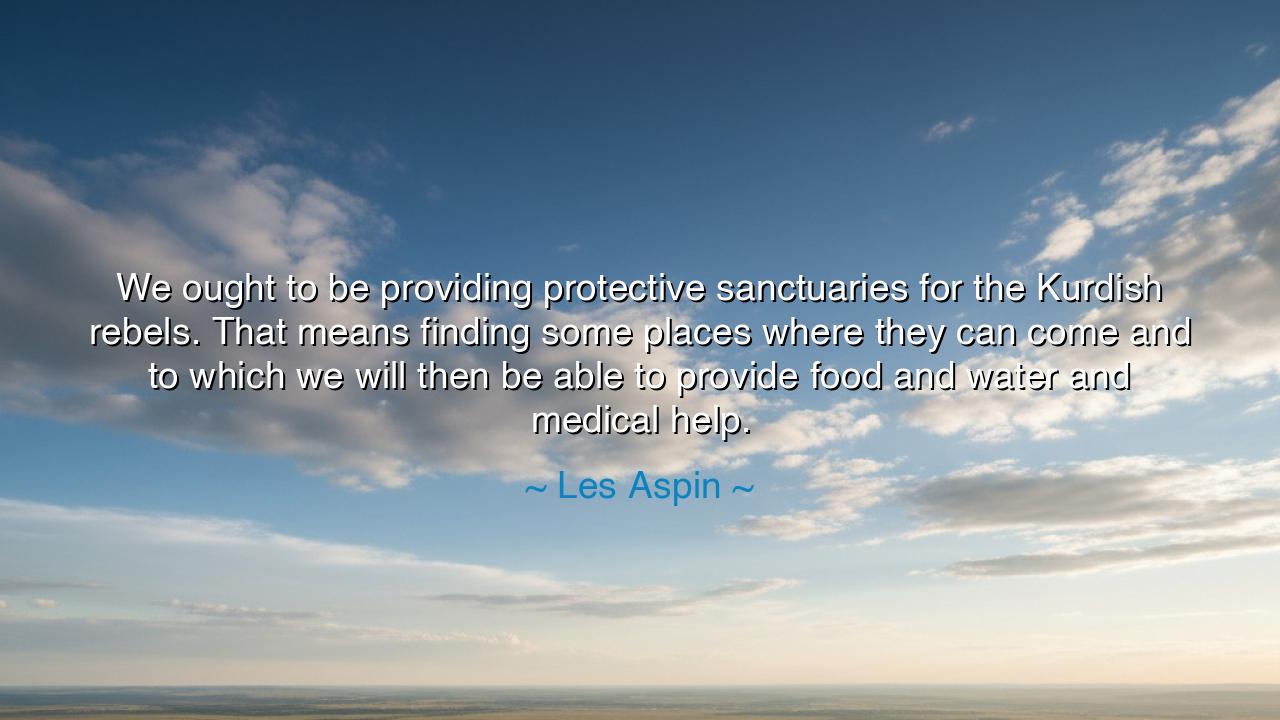
We ought to be providing protective sanctuaries for the Kurdish
We ought to be providing protective sanctuaries for the Kurdish rebels. That means finding some places where they can come and to which we will then be able to provide food and water and medical help.






In the words of Les Aspin there rises both duty and compassion: “We ought to be providing protective sanctuaries for the Kurdish rebels. That means finding some places where they can come and to which we will then be able to provide food and water and medical help.” His words, born in the aftermath of conflict, remind us that even in war, mercy must have a place. For it is not enough to fight battles and sign treaties—the true test of a people lies in how they shield the vulnerable, how they lift up those cast down by strife.
The mention of sanctuaries carries ancient weight. A sanctuary is not merely a refuge of stone or soil, but a sacred promise that within its bounds, life is honored and protected. From the temples of the Israelites where the persecuted could flee, to the cities of refuge in medieval Europe, sanctuaries have always stood as symbols of humanity’s higher law—that even in an age of violence, there must remain havens where the sword cannot strike. Aspin’s call to create sanctuaries for the Kurds was a call to uphold this timeless principle: that no people should be left without a place of safety.
The Kurdish rebels, at the time of Aspin’s words in the early 1990s, were a people crushed between the forces of Saddam Hussein’s regime and the shifting sands of geopolitics. After the Gulf War, tens of thousands of Kurds fled into the mountains, starving, freezing, dying in exile. They did not need more weapons—they needed food, water, medical help, and a place where their children could live without fear. Thus, Aspin, as a statesman, reminded his nation and the world that responsibility did not end with the cessation of battle, but continued with the care of those scarred by it.
History gives us many examples where this truth was tested. In the Second World War, millions of refugees wandered Europe—Poles, Jews, Greeks, and countless others—fleeing both the Axis powers and the hunger left in their wake. Where sanctuaries were offered, lives were saved, communities preserved, and future generations given hope. Where sanctuaries were denied, the names of the lost became numbers on the wind. Aspin’s plea for the Kurds echoes this ancient pattern: the choice between indifference, which kills silently, and sanctuary, which preserves the spark of life.
The deeper meaning of Aspin’s words is this: protection is not only about strength of arms, but about strength of compassion. To provide shelter, to give water, to offer medicine—these are acts as heroic as any battle, for they preserve not only the body but the dignity of a people. A sanctuary is a recognition that those who suffer are not strangers, but fellow humans bound to us by the same breath of life. And in offering aid, we affirm not only their worth, but our own humanity.
The lesson for us is profound. In our own lives, we may not command armies or draw maps of safe zones, but we too can create sanctuaries. A sanctuary may be a listening ear for the weary, a home opened to a friend in need, food given to the hungry, or protection offered to those who cannot defend themselves. Each of us, in our sphere, has the power to build spaces where others may find rest, healing, and hope.
Therefore, let Aspin’s words echo within us: seek to be a builder of sanctuaries. Do not look only to the grand stage of politics, but to the humble needs around you. Ask: Who is wandering without shelter? Who hungers for food, for kindness, for safety? And then, act. For every sanctuary, great or small, becomes a fortress of mercy against the world’s storms. And when we create such places, we join the lineage of those who, across the ages, understood that the highest victory is not in conquest, but in compassion.






AAdministratorAdministrator
Welcome, honored guests. Please leave a comment, we will respond soon